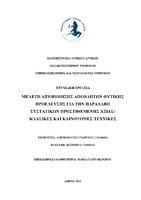| dc.contributor.advisor | Giannakourou, Maria | |
| dc.contributor.author | Ασημομύτης, Γεώργιος | |
| dc.contributor.author | Βλαχάκη, Δέσποινα | |
| dc.date.accessioned | 2021-07-20T12:22:22Z | |
| dc.date.available | 2021-07-20T12:22:22Z | |
| dc.date.issued | 2021-07-13 | |
| dc.identifier.uri | https://polynoe.lib.uniwa.gr/xmlui/handle/11400/859 | |
| dc.identifier.uri | http://dx.doi.org/10.26265/polynoe-710 | |
| dc.description.abstract | Η βιομηχανία τροφίμων δημιουργεί μεγάλες ποσότητες απορριμμάτων που απαιτούν προσεκτική διαχείριση ώστε η απόρριψή τους να πραγματοποιείται με τρόπο βιώσιμο και ασφαλή για τους ανθρώπους και το οικοσύστημα. Συγκεκριμένα, οι μονάδες επεξεργασίας φρούτων και λαχανικών παράγουν τον μεγαλύτερο όγκο αποβλήτων από κάθε άλλο κλάδο της βιομηχανίας τροφίμων. Το κόστος διαχείρισης των αποβλήτων αυτών επιβαρύνει τις επιχειρήσεις σε ένα κλάδο με μικρά περιθώρια κέρδους. Συνεπώς, η σωστή αξιοποίηση των παραπροϊόντων που παράγονται μπορεί να περιορίσει το κόστος διαχείρισης ή ακόμα και να προσφέρει μια νέα πηγή εσόδων. Η σύσταση των παραπροϊόντων φρούτων και λαχανικών τα καθιστά συμφέρουσες πρώτες ύλες για την ανάκτηση βιοδραστικών συστατικών ή τη μικροβιακή παραγωγή συστατικών ενδιαφέροντος. Η φύση των ανακτώμενων προϊόντων παρουσιάζει ευρεία ποικιλία, από πλαστικά και βιοκαύσιμα έως πρόσθετα τροφίμων. Σκοπός της παρούσας εργασίας αποτελεί η μελέτη των δυνατοτήτων αξιοποίησης αυτής της ανεκμετάλλευτης -σε μεγάλο βαθμό- βιομάζας. Επιπλέον, έμφαση δόθηκε σε ελληνικά προϊόντα όπως ελιές, τομάτες, εσπεριδοειδή κ.α. Ο τομέας της αξιοποίησης φυτικών παραπροϊόντων κερδίζει έδαφος στη σύγχρονη βιομηχανία τροφίμων, καλλυντικών, κλπ λόγω της αυξανομένης ζήτησης των καταναλωτών για φυσικά προϊόντα τα οποία έχουν παραχθεί με βιώσιμες και φιλικές για το περιβάλλον πρακτικές. | el |
| dc.format.extent | 162 | el |
| dc.language.iso | el | el |
| dc.publisher | Πανεπιστήμιο Δυτικής Αττικής | el |
| dc.rights | Αναφορά Δημιουργού - Μη Εμπορική Χρήση - Παρόμοια Διανομή 4.0 Διεθνές | * |
| dc.rights.uri | https://creativecommons.org/licenses/by-nc-sa/4.0/deed.el | * |
| dc.subject | Αξιοποίηση παραπροϊόντων | el |
| dc.subject | Εκχυλίσεις | el |
| dc.subject | Βιοκαύσιμα | el |
| dc.subject | Μικροβιακή παραγωγή | el |
| dc.subject | Διαχείριση αποβλήτων | el |
| dc.title | Μελέτη αξιοποίησης αποβλήτων φυτικής προέλευσης για την παραλαβή συστατικών προστιθέμενης αξίας- Κλασικές και καινοτόμες τεχνικές | el |
| dc.title.alternative | Study of the recovery of waste of plant origin for the extraction of value added compounds- Conventional and innovatie techniques | el |
| dc.type | Πτυχιακή εργασία | el |
| dc.contributor.committee | Στρατή, Ειρήνη | |
| dc.contributor.committee | Τριάντη, Μυρτώ | |
| dc.contributor.faculty | Σχολή Επιστημών Τροφίμων | el |
| dc.contributor.department | Τμήμα Επιστήμης και Τεχνολογίας Τροφίμων | el |
| dc.description.abstracttranslated | Current food industry is producing large quantities of waste and their disposal requires special treatments in order to be sustainable and safe for humans and the ecosystem. Especially fruit and vegetable processing plants are producing the largest volume of waste compared to any other sector of the food industry. The treatment and proper disposal of the waste is an economic burden for the producer in a field where the profit margins are slim. Therefore, valorization and sustainable exploitation of the byproducts produced can minimize the cost of disposal or even provide an alternative income source. The composition of fruit and vegetables byproducts makes them a suitable raw material for the recovery of bioactive compounds or the microbial production of valuable compounds. The produced compounds can vary greatly from plastics and biofuels to food additives. The aim of this thesis is to conduct a profound investigation of the valorization capabilities of this biomass, a huge percentage of which remains un- or under-exploited. An attempt has been made to mainly focus on Greek products such as olives, tomatoes, citrus products, etc. The valorization of fruit and vegetable waste is gaining ground in the food industry mainly due to the increasing demand of consumers for natural products that have been produced with sustainable and ecofriendly practices. | el |


